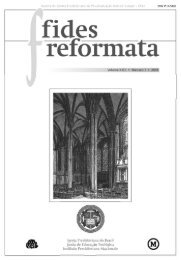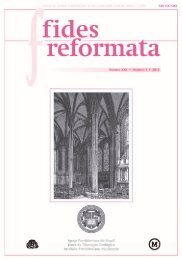Fides 22 N2
Um publicação do Centro Presbiteriano de Pós-graduação Andrew Jumper.
Um publicação do Centro Presbiteriano de Pós-graduação Andrew Jumper.
You also want an ePaper? Increase the reach of your titles
YUMPU automatically turns print PDFs into web optimized ePapers that Google loves.
LEANDRO LIMA, O PENSAMENTO ESCATOLÓGICO DE CALVINO<br />
A conclusão, portanto, é límpida: “que este nos seja o caminho mais<br />
curto: nos contentemos com o espelho e o enigma, até que contemplemos face<br />
a face [1Co 13.12]”. 46<br />
CONCLUSÃO<br />
Vemos, portanto, em Calvino uma escatologia sóbria, inteiramente a<br />
serviço da vida presente, distanciada de especulações, despreocupada em responder<br />
a todas as curiosidades dos homens, focada na ressurreição de Cristo<br />
e intimamente conectada com os conceitos soteriológicos desenvolvidos no<br />
período da Reforma. A linguagem e a concepção da mente humana nos impedem<br />
de entender plenamente o futuro e suas implicações, mas isso não significa<br />
que meditar sobre a vida futura seja algo inútil e infrutífero. Ao contrário, é<br />
uma tarefa sublime e necessária, desde que nos contentemos com o espelho<br />
e aprendamos a desprezar coerentemente a presente vida.<br />
ABSTRACT<br />
Since Calvin did not write a commentary on the book of Revelation, there<br />
is a tendency to believe that he did not care much about eschatology or that he<br />
felt unable to discuss the subject. This article demonstrates that such view can be<br />
wrong for several reasons, such as how Calvin in fact understood eschatology,<br />
his concern to avoid speculations, and his consciousness of the limitations of<br />
human language to describe the world to come. Departing from a contextual<br />
analysis of the Genevan reformer’s works, the article tries to highlight that<br />
there is an unbreakable connection between eschatology and soteriology in<br />
the work of the reformers, especially in Calvin. Despite his constant concern<br />
to avoid speculations, he did not evade the debate around several topics that<br />
he considered essential in order to maintain Reformed doctrine, particularly<br />
concerning resurrection and the intermediate state.<br />
KEYWORDS<br />
Calvin; Eschatology; Revelation; Theory of accommodation; Resurrection.<br />
46 Ibid.<br />
98




